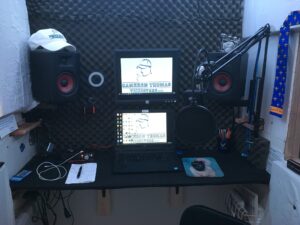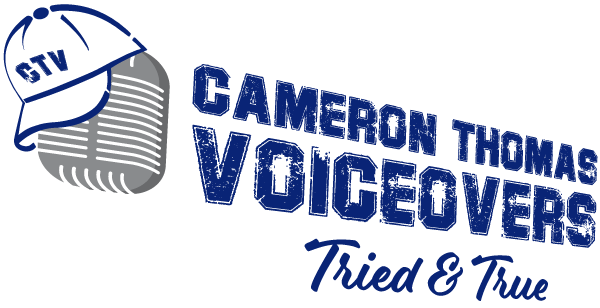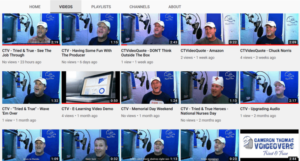So you’re interested in getting started in voiceovers. What is the one burning question about a starting point to voiceovers that you would ask? Think of it. Do you have it? Ok, now, DON’T ask it…yet!
If you’re new the voiceover world, do this BEFORE you ask.
Your homework!
Questions like “How do I get started in VO?”, or “How do you get work?”, or “What is the best voiceover mic?” are very common and perfectly legit questions for those new to the trade. The answers are out there in Facebook groups, websites, podcasts, Youtube, etc. You’ll find the VO community very helpful, supportive, and giving, but if you go into a group/forum asking for the secret formula without doing your homework FIRST, it may result in a little newbie jeering. I’m not a fan of that kind of treatment, so I want to help point you in the right direction.
When more folks started asking me how to get started in voiceovers, I started sending a note with tips from my experiences – I’ll share that with you below.
So You Are Interested In Getting Into Voiceovers?
“I heard you were interested in getting started into voiceovers so I’ll help out as best that I can. In lieu of a call, I’m sending along some info for you to read through first. This is based on my 15 years of experience doing voiceovers so it will help point you in the right direction. If you have any questions not covered in the info/links below, then I am happy to schedule a consultation – just send me an email for scheduling and rates.
My voiceover (VO) journey started on a whim after some time as a radio meteorologist and ski reporter but it took a LOT of time – like months – researching a transition into the VO world. I can’t say whether or not you have what it takes, but this info will cover just about any question that you may have.
Voice Over Research/Forums/Websites

about the voiceover industry
Just about everything I learned initially about VO was from online forums so this is a great place to start. You’ll find that the voiceover community is very supportive. Here is a real good one – http://vo-bb.com/phpBB2/ You will find a LOT of info on these forums and sites, so dig through all the threads and soak it all up. It will take some time. A particularly good area is the “Where To Start” section where you’ll find some very informative sites like these…
- https://iwanttobeavoiceactor.com/
- http://www.audioconnell.com/workshop/the-voiceover-entrance-exam-free-voice-over-e-book/
- Todd Schick has some good FAQs
- Voiceover Xtra
- World-Voices Organization
Voice Training & Coaching
After your initial research, finding a voiceover coach is absolutely key to evaluating your skills and finding your voice. Coaching takes time and commitment so be prepared to invest. Even experienced VOs use coaches on a regular basis and it’s common practice – even recommended – to have more than one coach.
If you’re looking for a hands-on, in-studio learning experience in the New Hampshire area, a voiceover friend of mine hosts a class that can help. But for online coaching/training, Gabrielle Nistico, Julie Williams, Rhonda’s Voice, Marc Cashman, Global Voice Acting Academy (GVAA), Such-A-Voice, and are a few that offer their expertise and may have some helpful online videos and classes. Marc Scott can help you with the marketing/business aspect of voiceovers – check out his Facebook Vopreneur page for a lot of great info. Many other coaches can be found through the Voiceover Xtra link above. Many voiceover talents come from acting/drama backgrounds so they have those acting chops that translate well to the microphone. Local schools/community colleges or theaters (improv) are great opportunities to develop those skills as well.
Working with a coach will prepare you for the next step – your demo.
Voiceover Demos

A demo is a sample of what you can do. This is your “business card” or “headshot” to potential clients and is the MOST critical aspect to connect you with voiceover work. Agents won’t even consider you without one. It depends, too, on what kind of work you’re going for, whether commercial, narration, e-learning, etc. Here is a site with some demo examples at Demos That Rock. A professionally produced demo is not cheap! Unless you work as a sound engineer or producer, do NOT self-produce your demo! I tried it myself early on and it most likely cost me work.
Working with someone locally would be best for in-person coaching and recording in a professional studio; however, it can be done remotely. I worked with a coach and studio in the Boston area but it tooks weeks of coaching, practice before getting into the studio to record my demo. You may even work with other voiceovers for dialogue portions of your demo.
Studio/Gear/Tech
To get started in voiceovers, you’ll need to record from a home studio. Among the previous “getting started” sites above, there are numerous other studio/gear resources. The Voiceover Bodyshop guys (Dan Leonard and George Whitam) have a great podcast series, “Tech Talk”, and other topics. Here are their Youtube and Facebook pages to browse through previous episodes.
If you like videos, the Booth Junkie (Mike Delgaudio) has been making VERY informative videos on studio gear for a long time – he does a great job talking about the basics and goes out of his way on actual demonstrations. Here’s one about setting up a studio. He does a lot of other studio/gear tutorials, microphone comparisons, and all sorts of other very helpful industry topics. 
To showcase your demos professionally, you absolutely need a website to where you can direct clients. Voice Actor Websites and VoiceActor.com have great website options tailored specifically for voice actors. Check out these interviews with their team here and here. They helped me build my site and for a reasonable cost. In fact, I enjoyed the experience so much, that now I am working for them helping other voice talent build their sites!
VO Rates
Each VO has their own rates based on many individual factors. Here are some resources that give you an idea of voiceovers can charge. Here’s the Global Voice Acting Academy (GVAA) site that shows general rates – plus they have a lot of other great resources, such as studio tech, demos, etc. The Edge Studio is another good site with similar resources around rates, studio tech, etc.
Everyone’s circumstances are different so rates may vary widely, but please understand how offering rates well below industry (non-union) standards can impact the industry as a whole. There has been much debate about it over the years so take some time to read up on that.
Getting Voice Over Work
After a LOT of homework, preparation, and a demo, you can then start marketing your voice. However, that topic is way more involved and would take more than a blog post to cover, so I am only going to touch on it briefly. Some say the business of voiceover is 80-90% marketing and the rest is actual recording so this will be the bulk of your work going forward. You could test the waters with “pay-to-play” casting sites. These are subscription sites where you pay an annual fee, and get access to auditions for various jobs, or “leads.” One of them is Voice 123 that I’ve had a lot of success with, but there are others like Boldago.
But most likely you will need to go directly to the source – talent agencies, video production companies, ad agencies, and marketing companies. This means emails, calls, social media, and networking in various ways to get your voice noticed. Marc Scott offers coaching on self-marketing – plus he has many videos and podcasts that cover this topic. One of my good friends, Nikki Lu Lowe, now offers a great coaching course called “The Drive” which covers the business of voiceover and setting it up for success.
I hope these tips help for now. All of the links above are those that I personally recommend based on my 15 years in the business and should help you get started. For an even more comprehensive library of reputable classes, coaching, demo producers, agents, etc, check this out!
Like I said, it takes a LOT of time reading and researching – like weeks and months, even years. Absorb as much as possible. It’s an ongoing learning experience, too, so don’t stop after hitting just a few websites. I’m still researching because industries change and evolve. You will eventually hear common themes and ideas about the business that will shape your approach to the world of VO so that you can start defining your path.
If it all sounds a little overwhelming, I’m happy to help you make sense of it all with a “getting started” consultation. Check out my VO Consultation page for more info.
I wish you luck in your voiceover journey!”
~Cameron Thomas


 Commercial Demo Video –
Commercial Demo Video – 


